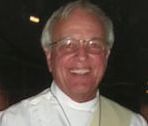Every Sunday following Canon Holly’s sermon, we recite the Nicene Creed thus affirming our faith. Anticipating this point in the service, questions always begin to arise in my mind about what I am affirming. Where in there is the living message of Christ, the living faith in Christ? The creeds for me have no warmth, no suggestion of the intimate experience of God’s presence in my life.
I believe and accept what the creeds proclaim. After all, Sacred Scripture are the foundation of what they mean to proclaim. I understand the necessity of drawing a line of strict orthodoxy beyond which we should not or cannot venture. The Greek language was used in the councils of Nicaea and Chalcedon. The leaders of the church, participating bishops, were necessarily specific, using nuanced meanings within the Greek language to determine what is accepted orthodox doctrine to confront prevailing heretical beliefs about God, Jesus and the Holy Spirit.
I find much more about my relationship with God, Jesus Christ and the Holy Spirit from the Iona Abbey’s “Affirmation of Faith,” excerpts of which I include here.
“We believe in God above us, Maker and sustainer of all life.
We believe in God beside us, Jesus Christ, the Word made flesh, servant of the poor, died forsaken, arose from the tomb, ascended to heaven to be everywhere present.
We believe in God within us, the Holy Spirit, life giving breath of the church, Spirit of healing and forgiveness, source of resurrection and eternal life.”
This has so much more meaning for me. It describes significant realities of my faith. God as a parent sustenance’s my life as a beloved child. Jesus Christ a person like me, born as I was born, who I can relate to, and everywhere present in my life. The Holy Spirit within me, breaths life, heals when I need healing, forgives when I need forgiveness. She is the source of my ultimate resurrection into eternal life.
I believe and accept what the creeds proclaim. After all, Sacred Scripture are the foundation of what they mean to proclaim. I understand the necessity of drawing a line of strict orthodoxy beyond which we should not or cannot venture. The Greek language was used in the councils of Nicaea and Chalcedon. The leaders of the church, participating bishops, were necessarily specific, using nuanced meanings within the Greek language to determine what is accepted orthodox doctrine to confront prevailing heretical beliefs about God, Jesus and the Holy Spirit.
I find much more about my relationship with God, Jesus Christ and the Holy Spirit from the Iona Abbey’s “Affirmation of Faith,” excerpts of which I include here.
“We believe in God above us, Maker and sustainer of all life.
We believe in God beside us, Jesus Christ, the Word made flesh, servant of the poor, died forsaken, arose from the tomb, ascended to heaven to be everywhere present.
We believe in God within us, the Holy Spirit, life giving breath of the church, Spirit of healing and forgiveness, source of resurrection and eternal life.”
This has so much more meaning for me. It describes significant realities of my faith. God as a parent sustenance’s my life as a beloved child. Jesus Christ a person like me, born as I was born, who I can relate to, and everywhere present in my life. The Holy Spirit within me, breaths life, heals when I need healing, forgives when I need forgiveness. She is the source of my ultimate resurrection into eternal life.


 RSS Feed
RSS Feed